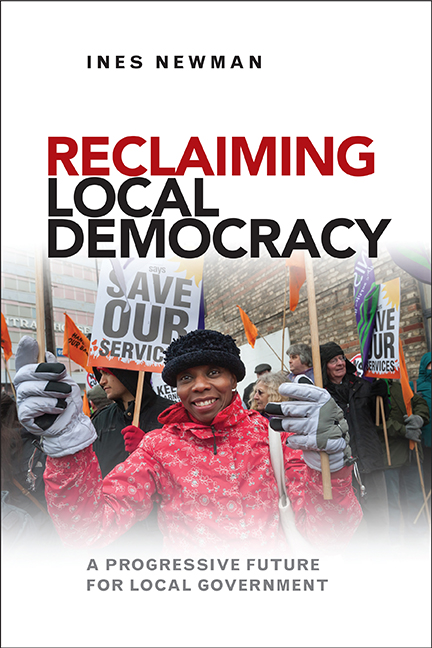Book contents
Five - Reclaiming local democracy
Published online by Cambridge University Press: 24 February 2022
Summary
Chapter Four has argued for an ethical framework constraining the market by focusing on emancipation, environmental and social protection and the promotion of social justice. The chapter emphasised process: the importance of public debate and discussion and the role of deliberation around the common good in developing citizenship. This debate is usually conducted through some form of democracy and politics, and it is to these concepts that this chapter turns.
The chapter starts by defining the concepts of democracy, accountability and participation. It argues that the current practice of democracy is dominated by a democratic elitism. This increases the power of business elites in relation to public policy. It also separates representative and participatory democracy, and attempts to depoliticise representative democracy. The dominance of democratic elitism has led to decentralisation and localism being consistently ‘misframed’ so that the links between local issues and national issues are not the subject of deliberation. This has an impact on both representative democracy and participation. The ward councillor role is seen as encouraging apolitical community engagement in the neighbourhood and little attention is given to how local demands can influence council-wide and national decision-making. There is a failure to understand the important role of the councillor in linking to the wider political project of furthering social protection, emancipation and social justice. Participatory democracy is also limited to residents as customers of services or local neighbourhood facilities.
If democracy is to be reclaimed, councillors will need to address power inequalities and to increase the capacity of individuals or groups to engage in the policy process. This is essential so that those without power can engage in meaningful deliberations about their needs and the common good, as advocated in Chapter Four. This chapter argues that a new version of local democracy is required that focuses on the relationship between different levels of government and civil society and what they are trying to do together. The chapter points to the ways in which councillors can enhance participation and explores in more detail the tensions between participation and rights and justice.
Defining democracy, accountability and participation
As Antony Arblaster (1991 [1987], p 6) makes clear, democracy used to be regarded as a ‘bad thing’, equivalent to the rule of the mob and fatal to individual freedom and civilised society.
- Type
- Chapter
- Information
- Reclaiming Local DemocracyA Progressive Future for Local Government, pp. 101 - 134Publisher: Bristol University PressPrint publication year: 2014



